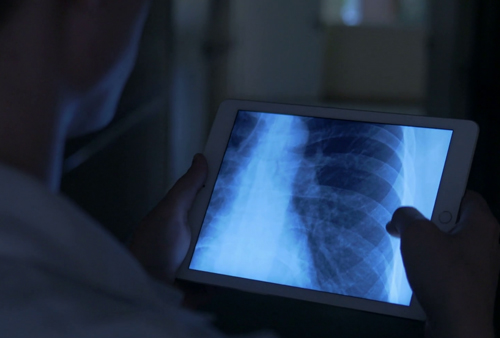Chronic obstructed pulmonary disease is a group of diseases that make it difficult for a person to breathe air out due to the narrowing of the airways. This is a progressive, incurable but manageable disease which includes emphysema (damage to the wall of air sac) and chronic bronchitis (inflammation of breathing tubes). Smoking is one the leading causes of this disease.
Unchecked and untreated COPD can cause long term disability. Without treatment, the symptoms get progressively worse, and a worsening of symptoms is known as a flare-up or exacerbation. Regular checkup with your pulmonologist or chest specialist is needed for optimal management.
What kind of symptoms should make you visit a doctor?
The most common symptoms of COPD are increasing breathlessness on exertion. Breathlessness or shortness of breath on sitting/or relaxing should be taken as a sign of advanced disease that necessitates immediate attention. Often patients may come in with a complaint of persistent cough with phlegm or mucus; color of the phlegm may vary depending on the exact cause or concurrent diseases. Frequent chest infections are often seen in individuals who suffer from COPD. Persistent wheezing is also seen.
Does COPD affect one or both lungs?
COPD is a diffuse illness, involving both the lungs. The degree of involvement may however be asymmetric with greater involvement of one lung over the other.
Does smoking cause COPD?
Smoking is by far the commonest cause of COPD. The damage that has been caused by smoking is irreversible, hence quitting smoking can prevent further damage and allow you to have a far better quality of life.
Can a nonsmoker develop COPD?
Yes, nonsmokers can also develop COPD, but the percentage is far smaller compared to smokers. There are other risk factor that play a role in non-smokers which can be genetic, prolonged exposure to second hand smoke, long term exposure to polluted air or biomass which are gases from burning wood and agricultural products, solid waste landfill gas alcohol fuels like methanol or bio-diesel. People exposed to burning fuels from cooking in smaller, poorly ventilated spaces are also at risk for COPD. Certain other rare genetic conditions also exist that raise the risk of developing COPD.
Can COPD be life threating?
Yes, if left untreated can lead to serious complication, requiring the use of oxygen cylinders, multiple hospital admissions and may require assistance of invasive or non-invasive ventilators to assist in the work of breathing. Sometimes when the air sacs within the lung become deformed and weak, they can rupture, causing air to leak out of the lungs leading to a condition call pneumothorax. Pneumothorax causes sudden difficulty in breathing, is a serious condition, and requires emergency treatment.
In certain situation, lungs are unable to carry oxygen to the tissues of the body and remove carbon dioxide, which leads to its accumulation of carbon dioxide causing a condition called respiratory acidosis. This excessive accumulation of carbon dioxide in the blood stream needs to be addressed immediately as a patient can require assistance of noninvasive/invasive ventilator to breathe.
Is there a cure for COPD?
There is no cure for COPD, however, one can improve the quality of one’s life by quitting smoking, managing and limiting aggravating factors that make the disease worse and going for regular check ups with a pulmonologist and following with the plan of care outlined by the chest specialist.
What is the treatment of COPD
COPD patients require not only medical treatment but also social and psychological support from friends and family. There are medicines which help in relieving of the symptoms and those that prevent further episodes of acute exacerbations. Some patients may require short term oxygen supplementation until their care is optimized. Others who may be suffering from advanced disease require long term oxygen therapy along with other supportive treatment. COPD patients are prone to recurrent respiratory tract infection such as pneumonia. These patients due to their higher level of risk for serious complications of pneumonia need to be properly vaccinated with the influenza/flu vaccine as well as the pneumococcal vaccine. It is important to bear in mind that if there are signs of fever, excessive sputum production, an early visit to the pulmonologist and timely, appropriate treatment can prevent any life-threatening conditions to arise. Respiratory/ breathing exercises also play important role for improving quality of life. To prevent episode of exacerbation, a regular visit to your pulmonologist or chest specialist is highly essential.
Should you or anyone you know require care for the symptoms, management or complications of COPD (bronchitis, emphysema), please contact The Chest Clinic-Dr. Javed Husain & Associates. Dr. Javed Husain is the lead pulmonologist at The Chest Clinic in Karachi. Dr. Javed Husain is a US trained and United States Board Certified specialist in Pulmonary Medicine, Critical Care and Sleep Medicine. He has over 20 years of experience dealing with patients with bronchitis, emphysema, asthma and all types of chest and lung diseases.
If you or anyone you know exhibits symptoms that are consistent with COPD requiring care please call The Chest Clinic for an appointment to see Dr. Javed Husain. Both in person and online consultations are possible. Please call +92301 8479066 to set up an appointment and an evaluation to rule out the possibility of COPD and if it exists to seek the most appropriate and beneficial treatment to ensure the best possible quality of life.

